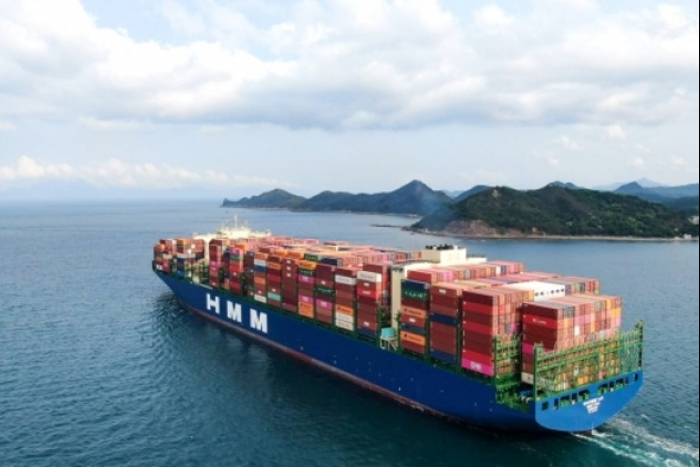Economy
S. Korea foresees recession in falling freight prices, wages
The world's largest shipbuilding country is forecast to have 43% fewer global orders in 2023 than in 2022
By Dec 26, 2022 (Gmt+09:00)
1
Min read
Most Read
LG Chem to sell water filter business to Glenwood PE for $692 million


Mirae Asset to be named Korea Post’s core real estate fund operator


KT&G eyes overseas M&A after rejecting activist fund's offer


Meritz backs half of ex-manager’s $210 mn hedge fund


StockX in merger talks with Naver’s online reseller Kream



Global ocean freight prices are falling amid a darkening outlook for South Korea, as Asia’s fourth-largest economy heavily depends on overseas trade, 99% of which is done by ship. Declining exports and production rates are threatening the country’s job security.
The Shanghai Containerized Freight Index (SCFI), one of the most widely used indices for ocean freight rates, fell 16.2 points from Dec. 16 to 1107.09 on Dec. 23. The latter figure is its lowest since July 31, 2020, when the index fell to 1103.47.
The SCFI, which hit a record-high 5109.6 on Jan. 7 this year, has witnessed a steady decline since June 10. Market watchers expect the index to plummet to a pre-pandemic level of 600-700 next year, worsening container shipping companies’ profitability.
Korean shipbuilders will receive far fewer overseas orders in 2023 than they did in 2022, according to an Export-Import Bank of Korea (KEXIM) report released last month. They are expected to win $22 billion worth of global orders next year, down 42.9% from this year, the report said.
The manufacturing industry’s production rate, a key indicator of the industrial economy, fell 270 basis points in October to 72.4%. That is the lowest figure since August 2020, when it hit 70.4% in the midst of the pandemic, according to government data.
The worsening economic conditions also impact salaries and the job market in Korea. The average real wage, which refers to a wage adjusted for inflation and the prices of goods and services, fell to 3.8 million won ($2,938.9) in September 2022, down 2.3% from a year ago. Real wages have steadily declined since April of this year as nominal wage growth failed to keep up with inflation.
A growing number of large companies in the retail, finance and shipping industries are carrying out voluntary resignations.
Lotte Group’s retail business operators, Lotte Duty Free and Lotte Himart, received voluntary resignation letters earlier this month. Financial services firms, including Hi Investment Securities Co. and Daol Investment Securities Co., and Korea’s largest container line HMM Co. also took the same measure in December to reduce labor costs.
Write to Ik-Hwan Kim at lovepen@hankyung.com
Jihyun Kim edited this article.
More to Read
-
 Korean stock marketKorean stocks with healthy earnings to shine in H2 2023
Korean stock marketKorean stocks with healthy earnings to shine in H2 2023Dec 15, 2022 (Gmt+09:00)
4 Min read -
 EconomyKorea’s 1st export decline in 2 years dims BOK’s big-step rate hike outlook
EconomyKorea’s 1st export decline in 2 years dims BOK’s big-step rate hike outlookNov 01, 2022 (Gmt+09:00)
3 Min read -
 ElectronicsSamsung smartphone shipments down 7.4% in Q3; outlook dim
ElectronicsSamsung smartphone shipments down 7.4% in Q3; outlook dimOct 28, 2022 (Gmt+09:00)
1 Min read -
 EconomyADB cuts Korea’s 2023 growth outlook as trade in deficit for sixth month
EconomyADB cuts Korea’s 2023 growth outlook as trade in deficit for sixth monthSep 21, 2022 (Gmt+09:00)
3 Min read
Comment 0
LOG IN


